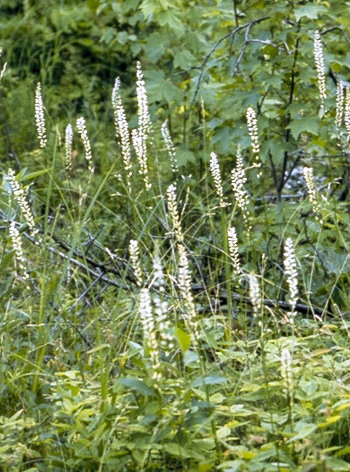Contents:
Common Names | Parts Usually Used | Plant(s) & Culture | Where Found | Medicinal Properties | Biochemical Information
Legends, Myths and Stories | Uses | Formulas or Dosages | Nutrient Content | Warning | Bibliography
Scientific Names

- Aletris farinosa L.
- Lily family
Common Names
- Ague grass
- Bitter grass
- Blazing star
- Crow corn
- Mealy starwort
- Star root
- Star grass
- True unicorn root
Parts Usually Used
Rootstock (rhizome)
Back to Top
Description of Plant(s) and
Culture
Colic root is a native North American perennial plant; its thick, fibrous rootstock produces a rosette of yellow-green, long, pointed, lanceolate, spreading basal leaves. The numerous white tubular-oblong, somewhat bell-shaped flowers grow in a terminal spike-like raceme on an erect, flower-stalk that reaches 1 1/2 to 3 feet in height. Flowering time is from May to August. The fruit is an ovoid capsule containing many oblong, ribbed seeds.
Back to Top
Where Found
Grows in grassy or sandy woodlands, barren places, in acid or peaty soils in the eastern half of North America, from southern Canada to the Gulf of Mexico.
Back to Top
Medicinal Properties
Bitter tonic, narcotic, diuretic, anti-inflammatory
Back to Top
Biochemical Information
Contains diosgenin, which has both anti-inflammatory and estrogenic properties, vitamin E.
Back to Top
Legends, Myths and Stories
Containing vitamin E as a preventative to miscarriage, it is dependable and free from affects during the entire period of gestation (pregnancy). Be sure to use only dried rootstock.
Back to Top
Uses
A decoction or tincture has been used for flatulent colic and for other digestive problems. Recommended for menstrual problems such as dysmenorrhea and menorrhagia. Stimulates appetite, jaundice, rheumatism, and a general tonic. Contains diosgenin, which has both anti-inflammatory and estrogenic properties.
Back to Top
Formulas or Dosages
The dried rootstock is used.
Decoction: boil 1 tsp. dried rootstock in 1 cup water. Take 1 cup a day, a mouthful at a time.
Tincture: a dose is from 15-40 drops. For menstrual problems, take in hot water.
Back to Top
Nutrient Content
Vitamin E
Back to Top
Warning
Use dried rootstock only. The fresh root, which is toxic, causes unpleasant internal effects, including dizziness, intestinal pains, vomiting and purging. The toxic effect is lost in drying.
Back to Top
Bibliography
![]() Back to Eden
Back to Eden, by Jethro Kloss; Back to Eden Publishing Co., Loma Linda, CA 92354, Original copyright 1939, revised edition 1994
![]() The Herb Book
The Herb Book, by John Lust, Bantam Books, 666 Fifth Avenue, New York, NY. copyright 1974.
![]() Eastern/Central Medicinal Plants
Eastern/Central Medicinal Plants, by Steven Foster and James A. Duke., Houghton Mifflin Company, 215 Park Avenue South, New York, NY 10000
![]() Planetary Herbology
Planetary Herbology, by Michael Tierra, C.A., N.D., O.M.D., Lotus Press, PO Box 325, Twin Lakes. WI 53181., Copyright 1988, published 1992
![]() The Complete Medicinal Herbal
The Complete Medicinal Herbal, by Penelope Ody, Dorling Kindersley, Inc, 232 Madison Avenue, New York, NY 10016, First American Edition, copyright 1993
![]() Indian Herbalogy of North America
Indian Herbalogy of North America, by Alma R. Hutchens, Shambala Publications, Inc., Horticultural Hall, 300 Massachusetts Avenue, Boston, Massachusetts 02115, 1973
![]() American Folk Medicine
American Folk Medicine, by Clarence Meyer, Meyerbooks, publisher, PO Box 427, Glenwood, Illinois 60425, 1973
![]() Webster’s New World Dictionary
Webster’s New World Dictionary, Third College Edition, Victoria Neufeldt, Editor in Chief, New World Dictionaries: A Division of Simon & Schuster, Inc., 15 Columbus Circle, New York, NY 10023
 An Instant Guide to Medicinal Plants
An Instant Guide to Medicinal Plants, by Pamela Forey and Ruth Lindsay, Crescent Books (January 27, 1992).
 The Rodale Herb Book: How to Use, Grow, and Buy Nature’s Miracle Plants (An Organic gardening and farming book)
The Rodale Herb Book: How to Use, Grow, and Buy Nature’s Miracle Plants (An Organic gardening and farming book), edited by William H. Hylton, Rodale Press, Inc. Emmaus, PA, 18049., 1974
